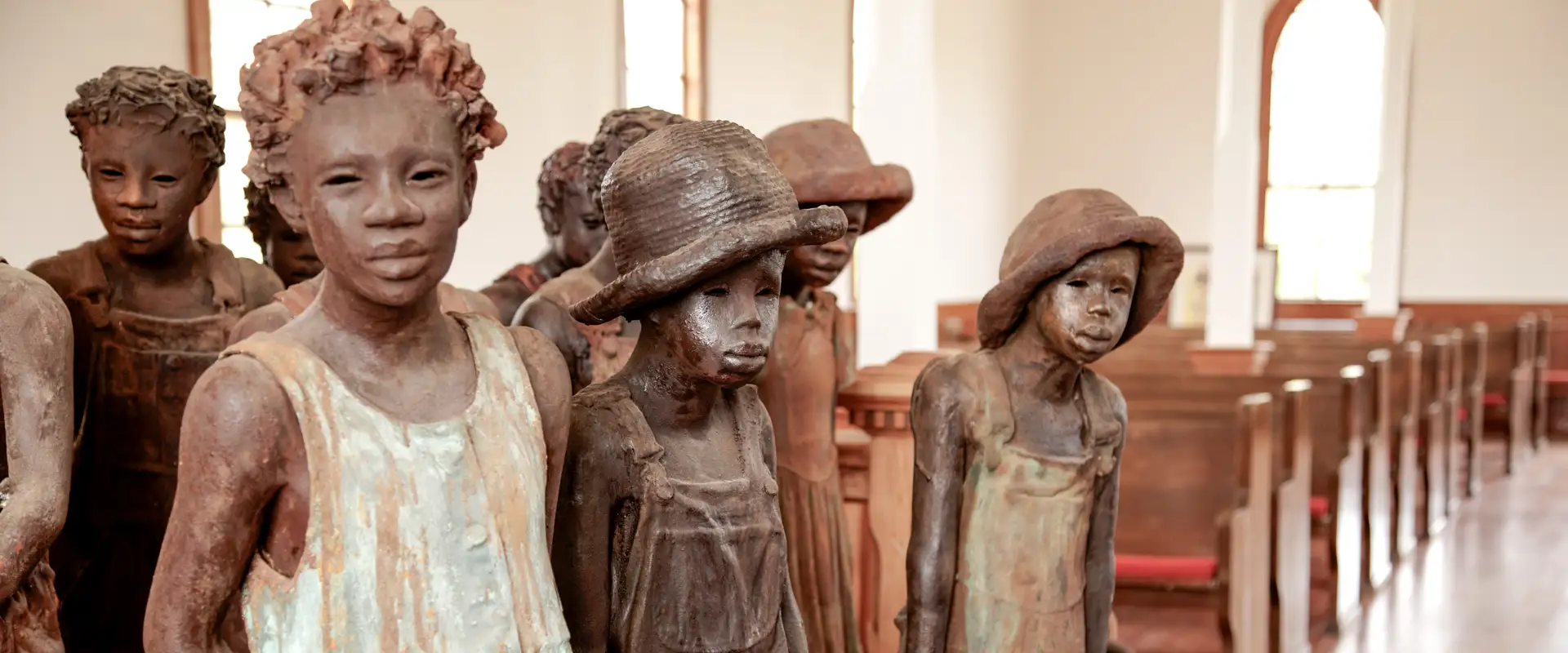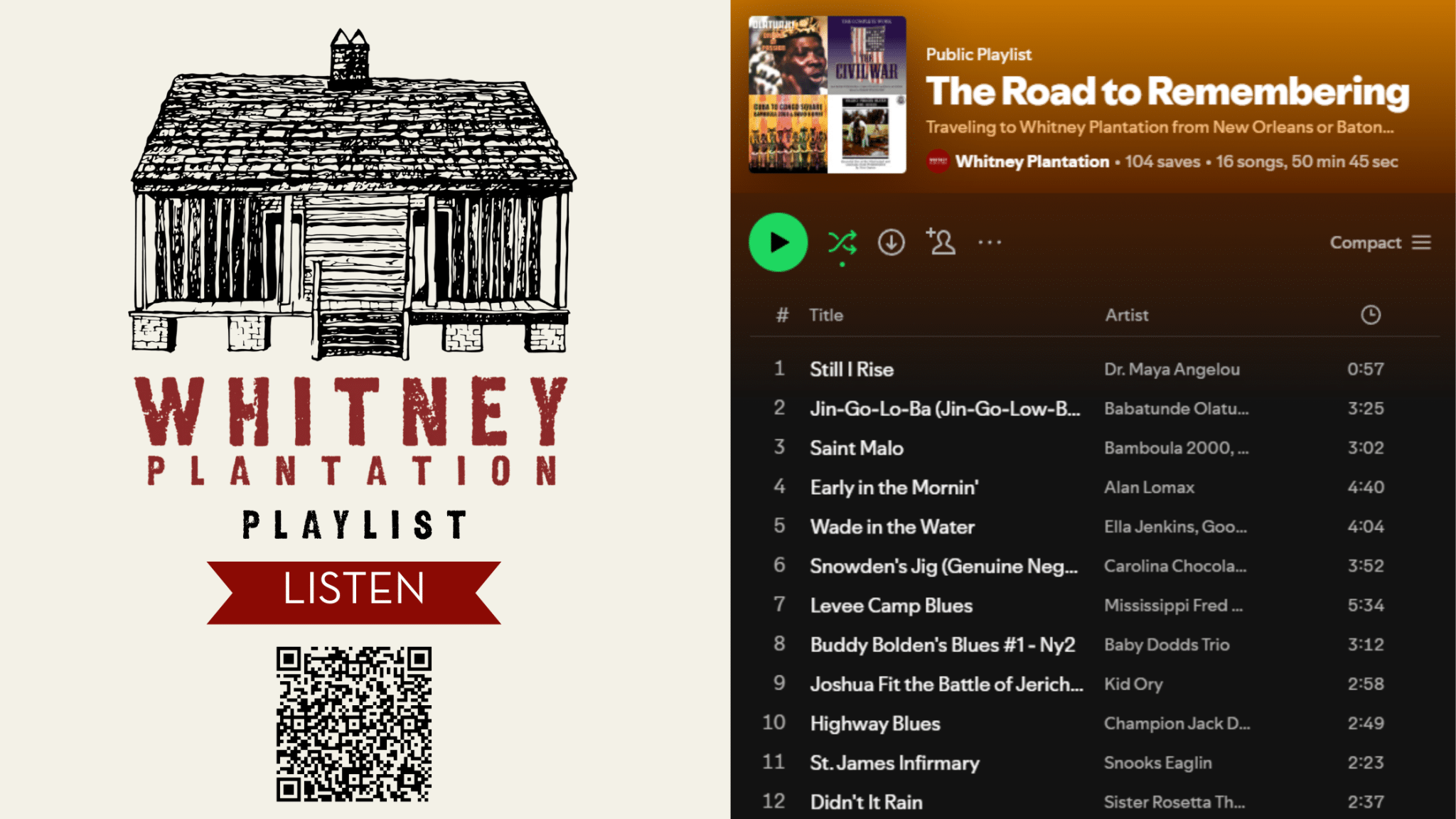After a visit to Whitney Plantation, the drive back can feel heavy or even overwhelming. That road stretching from Wallace to New Orleans winds past fields, sugar mills, small towns. The land itself holds memory.
We curated a special playlist for that drive.
Leaving Whitney Plantation
It’s called Road to Remembering, and it follows a historical and emotional arc, told through music. It begins in West Africa and ends in New Orleans. It’s meant to hold space for reflection about the past, about the labor that shaped this region, about the people who lived through it and left their mark.
It starts with Still I Rise by Maya Angelou, which is associated with slavery and uses the well known phrase, “I am my ancestors’ wildest dreams.” It’s meant to counter the weight of the tour by offering hope. The early tracks on the playlist are rooted in Africa. You’ll hear traditional rhythms and sounds that would have been familiar to many of the Africans who were trafficked to Louisiana in bondage. This music focuses on resistance to enslavement and the colonial regime. And what’s most remarkable about it is that these songs have survived generations.
From there, the music turns toward labor. Early in the Mornin’ is a field holler recorded at Angola Prison, which was once a plantation and still operates on a plantation model today. The men who sang this song were descendants of enslaved people, working the same crop, sugarcane, in the same region. When this song plays, you may find yourself driving past cane fields.
Wade in the Water comes next, a spiritual with double meaning. It speaks to faith and also to escape. Enslaved people used songs like this to warn others how to evade slave catchers: wade into water, and the dogs can’t track you.
As the playlist moves forward, the music begins to change. Snowden’s Jig is an old fiddle tune, revived by the Carolina Chocolate Drops, a Black traditional string band. It offers a glimpse into a style of music that was once widespread among Black musicians, long before it was claimed by white publishers. The song is instrumental, and a little haunting. Levee Camp Blues follows, connecting us to the early 20th century, when Black men who were often incarcerated were put to work building levees. It’s a continuation of forced labor by another name.
Nearing New Orleans
The next group of songs marks a shift in geography and time. You’re closer to the city now, and Jazz begins to emerge. Buddy Bolden’s music helped shape what we now call New Orleans jazz. Kid Ory, born on a nearby plantation, carried his early influences into the city. His story echoes that of so many who left rural life in search of something different.
Champion Jack Dupree adds piano and soul. Highway Blues speaks to the loneliness and hope of the Great Migration, when Black families left the countryside for the city, or for cities farther north. That migration was physical, but it was also emotional, a parting from land, from community, from the known.
Then comes St. James Infirmary, a song with deep ties to New Orleans. Though its origins are in England, the version most people know was shaped here. It’s still played in second lines and jazz funerals. Grief, beauty, defiance all wrapped together.
Sister Rosetta Tharpe follows, with her electric guitar and gospel voice. Her sound influenced rock and roll, though she’s rarely credited. Nina Simone’s Backlash Blues brings the mood into sharper focus, direct, political, and honest about the struggle that continued long after emancipation.
Near the end of the playlist, you’ll hear someone whose story is rooted right here at Whitney. Cousin Joe, or Pleasant Joseph, was born on this land in 1909. His father and grandfather were field workers and cart drivers. As a child, he was sent back to Whitney each summer to work in the fields. He wrote about the moment he decided he wouldn’t return. “Me and hard work fell out,” he said. His voice is part of our award-winning audio tour, and his story reminds us how recent this history is.
The final track is a quiet instrumental by New Orleans’s own Allen Toussaint. It slows things down. No lyrics, just feeling. A moment to breathe before the drive ends.
This playlist attempts to help carry the weight of what you’ve seen and learned at Whitney Plantation. These songs tell a story that begins long before Whitney was born and continues far beyond it. If you let it, the music will keep you company on the road back.
And maybe for a while after that.


